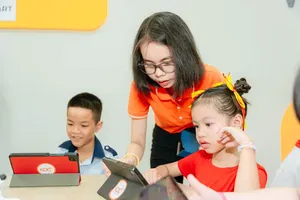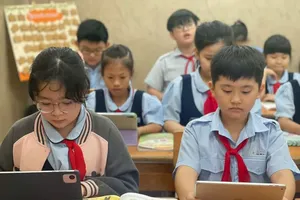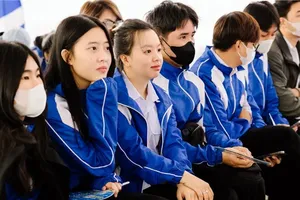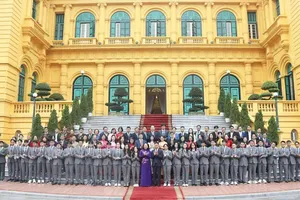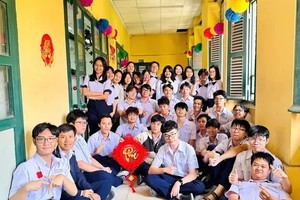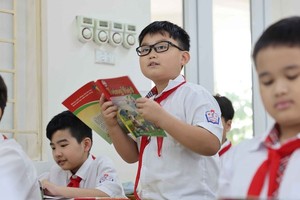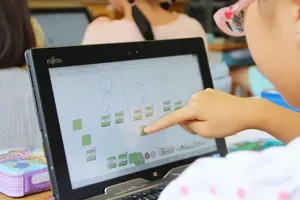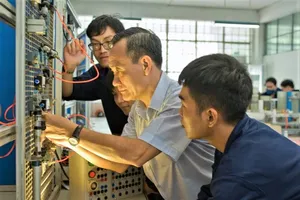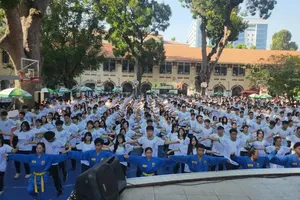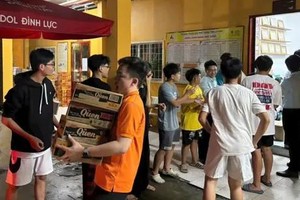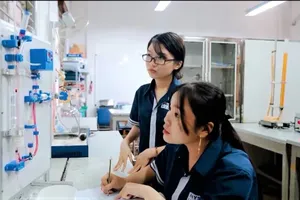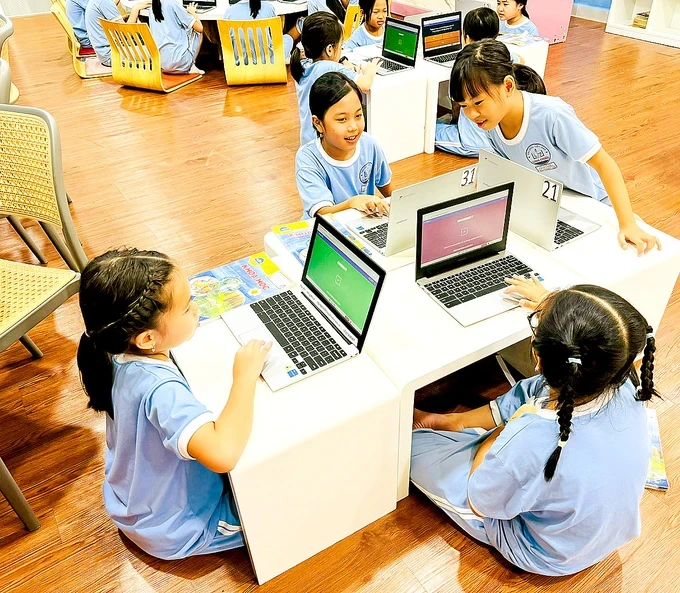
For over two months, pupils in class 4/1 of Tran Quang Khai Primary School in Thu Duc City have enjoyed a revitalized classroom, thanks to a parent-led initiative. Earlier in the 2024-2025 academic year, worn furniture and a damaged podium created safety concerns. Parent Representative Board Head Nguyen Duc Ngan proposed a renovation project, gaining school approval.
Over weekends, parents volunteered time and materials to repair the floor and refurbish the furniture, minimizing costs. Homeroom teacher of the class Nguyen Thi Khanh expressed gratitude, noting the improved learning environment and the valuable lesson in responsibility and appreciation instilled in students.
At another school in the same city, Linh Chieu Primary School, students in grades 3, 4, and 5 are now benefiting from Chromebook devices in dedicated Google classrooms for one class period per week. These cloud-integrated devices have streamlined both teaching and learning. Each student has a personal online account to interact with class activities, enabling teachers to easily monitor and assess individual progress.
Dang Thi Anh Phuc, a student in class 4/6, shared that actively interacting with the material and participating in knowledge-reinforcing games is far more engaging and effective than passively observing projected images on a screen or interactive whiteboard. The Chromebooks were acquired through finance mobilized from social resources.
Beyond Thu Duc City, numerous primary and secondary schools across the districts of 1, 3, and Tan Binh have acquired electronic devices through a similar method in order to enhance interaction and facilitate teaching and learning. Schools have adopted various approaches, from installment purchase plans to leasing agreements with suppliers. Funding for these initiatives comes from a variety of sources, including philanthropic donations, corporate sponsorships, and parent contributions.
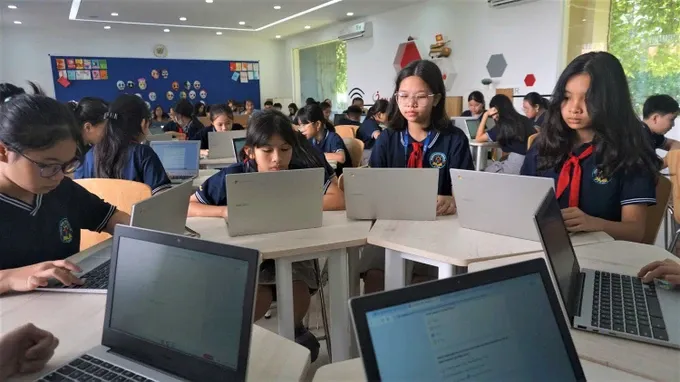
Head Le Duy Tan of the Secondary Education Division under the HCMC Department of Education and Training observed that without mobilizing social resources, schools would struggle to implement smart education initiatives. Given the constraints on public education funding, schools must proactively and effectively leverage social resources to provide optimal learning conditions for students.
Deputy Head Ha Thanh Hai of the Division of Education and Training of District 7 also noted that under the 2018 General Education Program, students in the two-session/day model have surplus learning time after completing the required core curriculum hours.
Consequently, integrating school-based programs and enhanced educational activities to ensure a full two-session schedule is appropriate and permitted by the Ministry of Education and Training. This approach supports the comprehensive development of students’ skills, knowledge, abilities, and personality.
The principal of a high school in District 1 explained that current state budget allocations for educational institutions only cover basic operational costs. Implementing models such as smart classrooms, smart libraries, and other advanced learning environments requires the combined resources of various stakeholders, both within and outside the school community.
To ensure parental support for fundraising initiatives, schools must first develop well-defined plans that clearly outline objectives, beneficiaries, and transparent budget projections. Critically, accepting donations must adhere to the principle of voluntarism, with no prescribed average or minimum donation amounts. Instead, individuals and organizations should be encouraged to contribute as they see fit.
Since Resolution 29-NQ/TW, date November 4, 2013, social resource mobilization for education has significantly progressed. The policy on reformed management, strengthened institutional autonomy, and accountability have facilitated this. Politburo Conclusion No. 91-KL/TW, released on August 12, 2024 calls for further decentralization to increase autonomy, enhance accountability, and foster democracy within educational institutions.
Currently, according to Minister of Education and Training Nguyen Kim Son, the governing body is refining the mechanisms and investment policies for education, emphasizing the State’s leading role while simultaneously promoting the socialization of education and mobilizing the effective participation of the entire society.
The focus is on addressing obstacles to financial autonomy within the public education system, while encouraging the development of the non-public system through preferential policies related to land, taxes, and credit to increase investment resources for education.
Statistics from the HCMC People’s Committee reveal that in 2024, the state budget accounted for approximately 60 percent of the funding for school repairs and construction within the public system. Loans from investment funds and other sources contributed 15 percent, with the remaining 25 percent derived from social resource mobilization.
Between 2016 and 2022, 30 new public schools, comprising 503 classrooms, were commissioned, with a total investment of approximately VND440 billion (US$17.4 million). In addition to the public school system, the city has actively developed private, independent, and foreign-invested schools. Within export processing and industrial zones, as of the beginning of the 2024-2025 academic year, the city had four non-public kindergartens and 24 kindergartens located adjacent to or within these zones, providing childcare services for workers and local children.
Deputy Director Le Hoai Nam of the HCMC Department of Education and Training announced that HCMC will soon launch 86 school projects under public-private partnerships, each with an investment exceeding VND100 billion ($3.95 million). This collaborative approach between the State and the community aims to maximize investment in education and broaden access to diverse educational services.
“As the entire educational sector is accelerating digital transformation, the policy of social resource mobilization for education plays a crucial role in effectively leveraging these resources for educational development. However, this policy should not be interpreted as simply shifting the financial burden onto learners. Instead, it requires securing diverse resources from across society, including organizations, businesses, partners, and philanthropists. Furthermore, contributions should not be limited to monetary donations but can take various forms, such as contributing expertise, experience, or sponsoring educational equipment.”
Le Duy Tan – Head of the Secondary Education Division, HCMC Department of Education and Training.




